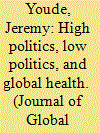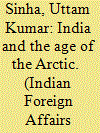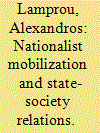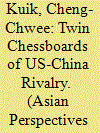|
|
|
Sort Order |
|
|
|
Items / Page
|
|
|
|
|
|
|
| Srl | Item |
| 1 |
ID:
145532


|
|
|
|
|
| Summary/Abstract |
It has become commonplace to argue that global health has ascended from “low politics” to the ranks of “high politics” in international relations—those issues of existential importance to the state and which concern its very survival. Despite its ubiquity, the actual substance of such a shift in the framing of global health is largely unexamined. In this article, I argue that empirical evidence belies the idea that global health is a “high politics” issue. This dichotomy makes little sense, and efforts to reframe global health as a “high politics” or securitized issue rarely succeed. While it is undoubtedly true that global health has received significantly greater attention from the international community over the past twenty-five to thirty years, that attention does not spring from global health being reframed as a “high politics” issue for states.
|
|
|
|
|
|
|
|
|
|
|
|
|
|
|
|
| 2 |
ID:
084725


|
|
|
|
|
| Publication |
2008.
|
| Summary/Abstract |
This article considers two perspectives of the post-Communist European integration movement. One perspective addresses rational choice economics in driving support for both the European Union, a low politics organization that emphasizes trade and social policies and NATO, a high politics defense organization. The other perspective addresses the impact that languages and ethnicity have, two factors derived from Anderson's notion of an imagined community. These two perspectives exhibit differences on how voters perceive and endorse integration in three societies in three different parts of the former Warsaw Pact. In those societies that are more ethnically and linguistically heterogeneous such as Bulgaria and Latvia, there is greater variation in backing endorsement for Western Europe from 1997 through 2004 than in societies that are more homogeneous such as Poland.
|
|
|
|
|
|
|
|
|
|
|
|
|
|
|
|
| 3 |
ID:
122074


|
|
|
| 4 |
ID:
126644


|
|
|
|
|
| Publication |
2013.
|
| Summary/Abstract |
This article studies the campaign against the use of non-Turkish languages that was organized by local forces in Izmir in 1934. In contextualizing the campaign within domestic politics and state-society relation, the article attempts to study domestic politics through a local perspective and explore the impact that similar events in the periphery had in the centre's policies, which the literature is usually inclined to comprehend solely with reference to state 'high politics'. The article argues that cases of autonomous mobilization from below, such as the 1934 Izmir campaign, contributed to the evolution of the Turkish political regime in the 1930s by turning the centre towards decisions that would redesign the relationship between the state and the ruling party, and have an impact on state-society relations.
|
|
|
|
|
|
|
|
|
|
|
|
|
|
|
|
| 5 |
ID:
120679


|
|
|
|
|
| Publication |
2013.
|
| Summary/Abstract |
While the EU's policies towards non-member states are often discussed within frameworks of 'high politics', one of the most important features of the European Neighbourhood Policy is its emphasis on the 'low politics' of sectoral dialogue in functionally differentiated policy fields. Examining policy change triggered in Ukraine by the EU's neighbourhood policy framework, the essay focuses on environmental policy as a typical 'low politics' policy field. The results show that in four sub-fields of environmental policy case-specific constellations of domestic veto players, policy-specific conditionality and external capacity building determine domestic policy change.
|
|
|
|
|
|
|
|
|
|
|
|
|
|
|
|
| 6 |
ID:
177652


|
|
|
|
|
| Summary/Abstract |
This essay offers a small state perspective on US-China rivalry
in the post-COVID-19 era. After tracing the emergence of
the “twin chessboards” of big power rivalry, namely, high
and low politics competitions, the essay assesses the impact
of these competitions on the post-pandemic Asian order,
with a focus on Southeast Asia. I argue that while US-China competition has been rising rapidly in high politics (that
is, in the military field), the increasing importance of low
politics—infrastructure and connectivity development, technology, trade, finance, public health, and other functional
areas—is shaping the prospects, pace, and patterns of the
onset of Cold War 2.0. The intensified US-China animosity
across the twin chessboards is widening the scope of the
competition, increasing the number of players, and mounting pressure on all smaller states. Arguably, however, it is
also providing these smaller states with more maneuvering
space. These developments reshape geostrategic supply and
demand in Southeast Asia. Accordingly, the smaller states
are developing additional layers of partnerships with actors
near and far, thereby broadening their hedging options in
an increasingly uncertain and high-stake environment.
|
|
|
|
|
|
|
|
|
|
|
|
|
|
|
|
|
|
|
|
|